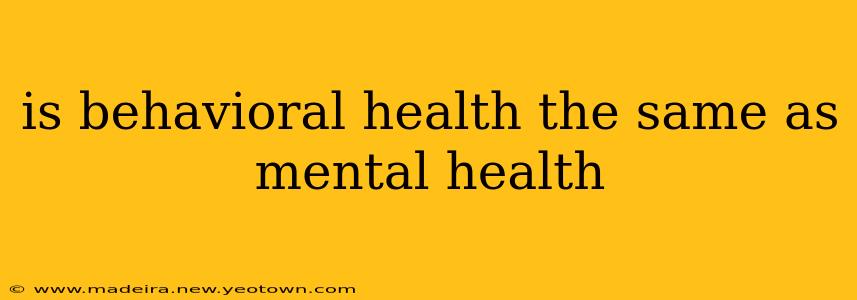Is Behavioral Health the Same as Mental Health? Unraveling the Nuances
The terms "behavioral health" and "mental health" are often used interchangeably, leading to confusion. While closely related, they aren't exactly the same. Imagine it like this: mental health is the broad ocean, while behavioral health is a significant, powerful current within it.
Let's dive deeper into the distinctions and explore some common questions surrounding these crucial aspects of overall wellness.
What is Mental Health?
Mental health encompasses our emotional, psychological, and social well-being. It influences how we think, feel, and act. It also helps determine how we handle stress, relate to others, and make choices. Good mental health is essential for navigating life's ups and downs, building strong relationships, and achieving our full potential. Think of it as the overall landscape of your inner world – your thoughts, feelings, and how you cope with life's challenges. A healthy mental state is characterized by resilience, adaptability, and a sense of purpose.
What is Behavioral Health?
Behavioral health focuses on how our thoughts, feelings, and behaviors interact. It examines the observable actions and reactions we exhibit, and how these are influenced by our internal mental state. It's not just about diagnosing and treating conditions; it's about understanding the connection between our minds and our actions. For example, behavioral health professionals might work with individuals to manage their responses to stress, improve coping mechanisms, or change unhealthy patterns of behavior. This current within the ocean of mental health addresses the how of mental well-being – the actions and reactions stemming from our internal landscape.
Are Behavioral Health and Mental Health Interrelated?
Absolutely! They are intricately intertwined. Mental health conditions often manifest through behavioral symptoms. For instance, someone experiencing depression might exhibit withdrawn behavior, loss of interest in activities, or changes in sleep patterns. Addressing these behavioral symptoms is a crucial part of treating the underlying mental health condition. Conversely, unhealthy behaviors can negatively impact mental health. Substance abuse, for example, can exacerbate existing mental health issues or even trigger new ones.
What are Some Common Behavioral Health Issues?
Behavioral health issues encompass a wide range of challenges. Some examples include:
- Substance use disorders: Addiction to drugs or alcohol.
- Eating disorders: Conditions like anorexia nervosa, bulimia nervosa, and binge eating disorder.
- Impulse control disorders: Problems controlling impulsive behaviors, such as kleptomania or pyromania.
- Anxiety disorders: Conditions like generalized anxiety disorder, panic disorder, and social anxiety disorder.
- Mood disorders: Conditions like depression and bipolar disorder.
- Trauma-related disorders: Conditions resulting from exposure to traumatic events.
These disorders often demonstrate behavioral symptoms that are addressed through behavioral health interventions.
How are Behavioral Health Issues Treated?
Treatment for behavioral health issues varies depending on the specific condition and individual needs. Common approaches include:
- Therapy: Various forms of therapy, such as cognitive behavioral therapy (CBT), dialectical behavior therapy (DBT), and family therapy, help individuals identify and change unhealthy thoughts and behaviors.
- Medication: Prescription medications can help manage symptoms, particularly for conditions like depression and anxiety.
- Lifestyle changes: Adopting healthy habits, such as regular exercise, a balanced diet, and sufficient sleep, can significantly improve behavioral and mental health.
In Conclusion: A Holistic Approach
While distinct in their focus, mental health and behavioral health are inseparable components of overall well-being. A holistic approach that addresses both the internal mental state and the outward behavioral manifestations is essential for achieving and maintaining optimal health. Understanding the nuances of these terms allows for a more comprehensive understanding of the complexities of mental wellness and access to the appropriate resources and support.

